All images courtesy of ORG Music
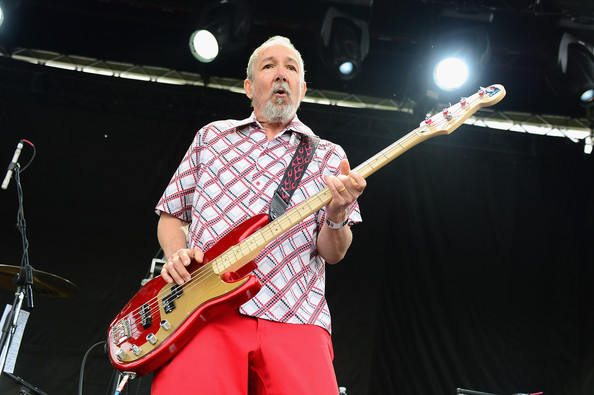
When I first started this series of interviews, Andrew Rossiter from Org Music asked me if I would like to interview Chuck Dukowski. My response was swift and to the point — “It would be an honor.” Little did I know that it would be the start of something. Having the opportunity to interview so many artists, across so many genres has been an interesting and eye-opening experience.
As a kid, I never had any real role models to speak of, and so, I grew up idolizing artists of all shapes and sizes. If you told me then that I would be interviewing some of the very people I grew up idolizing, I’d have said you were crazy. I thought, coming from where and what I come from, you simply don’t get these kinds of chances. But, as they say, life is what you make it, and as it turns out, coming from where and what I come from, you do get these chances if you’re willing to work for it.
Chuck Dukowski is no stranger to hard and work and perseverance himself. Many of you know Black Flag and I hope that at least some of you are familiar with Würm. Chuck is one of the true founding fathers of Punk Rock and he’s a low-key contributor to both the Metal scene and Proto-Metal scene.
Like I said before, listen to Würm and you’ll get it. Chuck’s history in music is colorful and iconic. Simply put, without him, there is no Black Flag as we know it. Furthermore, Punk Rock would not have been shaped in the same way had it not been for Chuck Dukowski’s indelible influence on the genre. He’s been in the game for well over 40 years and his memory is incredibly sharp, and his stories are vivid.
So, I am very happy to present to you my “sit down” with Chuck Dukowski. I hope you enjoy getting to know him as much as I do. Lastly, I would like to thank Andrew Rossiter and the incredible people over at Org Music. Without them, this interview would not have been possible.
Andrew:
Chuck, thank you so much for taking the time to speak to us! Tell us about your back story. How did you get into playing music? What was your musical gateway so to speak?
Chuck:
Loving to listen to music made me want to play music. Music was always playing in my family’s home when I was growing up and we attended Classical and Jazz/Avant-Garde live music events frequently. Since I can remember, I have had rhythms or music going in my head. Playing drums seemed cool to me at first, but when I picked up a bass a few years later, I’d found my instrument. I loved/love it.
Andrew:
You are/were the bassist and founding member of both Würm and Black Flag in the late 70s and early 80s. That was such a rich time for Punk and Alternative music in general. What was it like coming up in those bands around that time?
Chuck:
Black Flag and WÜRM were very different bands in overlapping but different eras and styles and they had some very different experiences. WÜRM started in the early side of the mid-70s with just me and my high school friend, Ed Danky. At first, we were bad at playing but we loved it and jammed as much as possible. We always had a difficult time getting shows because we never exactly fit the prevailing musical context. We did our first club show in 1974 at Jake’s Bar and Grill near Fort Atkinson, Wisconsin. Our second was a month later at a park event called Fort Fest. Our third was in early 1977 at Under the Pier in Redondo Beach California. We did develop a small following playing a fair number of bootleg shows and free shows in parks, schools, and parties. We also did a few self-promoted college shows opening events we promoted at our campuses through school-sanctioned non-profits we founded. We did straight up unauthorized shows in public venues if we realized there was electrical power available somewhere at the site. (These shows were the inspiration for later similar Black Flag shows I organized in commandeered vacant LA blocks and courtyards and the LA federal building.) WÜRM did a particularly good bootleg show at People’s Park in Isla Vista in the spring of 1977. Rolled up, set up, and played for a couple of hours. People dug it and much fun was had. We played school dances and lunches and even the Dean of Occidental College’s birthday party. We were comic relief at the Dean’s party since the Dean was the person who shut down our parties at the school’s auditorium and amphitheater. They’d just finished dinner and were having drinks seated at tables on a courtyard patio. We blew minds. We even broadcast some live performances on the school radio where Ed was a DJ. Most rock club bands at that time played all or mostly cover songs. WÜRM never relied on covers and played only our own compositions from day one with the exception of an early cover of Willie Dixon‘s ‘Wang Dang Doodle’ and our 1981 recorded cover of ‘The Time Has Come Today.’ WÜRM did not really find much acceptance until we reformed in the early 80s (We’d stopped playing in the fall of 1977). Then our experience was much more positive. Times had finally started to find us.
Black Flag was unique within but a part of Punk Rock, which was going strong when we formed as PANIC in 1977 and finally started playing shows in ’79. We played faster, harder, wilder, and louder than most Punk bands and all mainstream music of the time. Unlike WÜRM, Black Flag quickly found an audience in the Punk Rock world. Neither Black Flag nor WÜRM were popular with authorities. Black Flag was challenging to the mainstream music and general cultures and threatening to civic authorities, especially the police, who feared we were like 60s radicals but in leather jackets with shivs. We were fated to have a very difficult time with police that got more and more confrontational with time and our growing audience. We were arrested and hauled off to jail for playing a show and our shows were shut down numerous times by helmeted, billy club and shield-wielding riot squads with air support. Our offices were targeted for surveillance and harassment. Our phones were tapped. It was difficult to even drive my van around anywhere near where we lived because the police learned who I was and would pull me over and harass me every time they caught sight of me. We had a tough time finding venues when we got more popular because the police called the venue owners and told them they’d better not let us play in their space or else. It was frustrating and angering. It was exciting and even fun to stand up to the Man and we developed a large following and a thriving record label.
Andrew:
In 2018, Org Music put out one of my favorite releases of the year in Exhumed. I will admit, before that time I wasn’t very familiar with Würm. That being said- what an incredible band! Würm ran the gamut of genres, and I can see how they influenced literally everyone from the Melvins to the droves of Punk and Hardcore bands that came out in the 80s. How did Würm get its start?
Chuck:
WÜRM came out of my musical explorations with guitarist Ed Danky. We started out playing any instrument we could find, pianos, recorders, and assorted rhythm instruments in 71-72 (Ed was a trumpeter but I didn’t even know that for quite a while). We’d smoke pot, jam, and listen to music. We often recorded our jams and we’d listen to them while we hung out afterward. Eventually one of our friends got a bass, guitar, and an amp. I picked up that bass one day and I was hooked. I got a bass of my own right away and started playing every morning through my dad’s hi-fi. When I went to college in late ’72, I had the chance to buy an electric guitar for $20 from a guy in my dorm that I’d done a jam with and I gave it to Ed for X-Mas in 1972. The next summer, we traveled all through North America in Ed’s VW camper. I got a little 12v amplifier and made a speaker cab with a 12″ speaker in it for the trip. We took our instruments and jammed every evening if we could. It was pretty awesome jamming out on the banks of remote rivers in the Canadian Rockies, in the mountains of Mexico, and cities towns, and beaches of America. We would talk about how cool it would be to be touring as a band and actually playing shows in the cities and towns we visited (I kept that dream alive and eventually made it real with Black Flag). When we got done with college, we decided to try and make a go of being a band before going on to graduate school. The real story starts there is a series of crazy spots we rented to jam and live in. We almost always got evicted within 60 days. Once we lived in a 5th-floor rooftop former cafeteria for a west Long Beach downsized camper manufacturer where we had a particularly eventful eviction. We’d just finished a jam and were chilling with some friends, taking bong hits and having a beer when we noticed bright lights flashing outside on our rooftop patio. That was weird because we were five floors up. We looked out the window and saw a police helicopter circling and cruisers and a bunch of pigs milling around on the ground below. They demanded that we come down and let them in but we blew them off and closed everything up and hid inside. The helicopters dropped pigs down ropes and the ground pigs threw lines up and came up the wall. They got in and our days there were done. A handful of WÜRM pads and an equal number of evictions later we were at the WÜRMHOLE in Hermosa Beach (We were evicted from the WÜRMHOLE 7-8 months later).
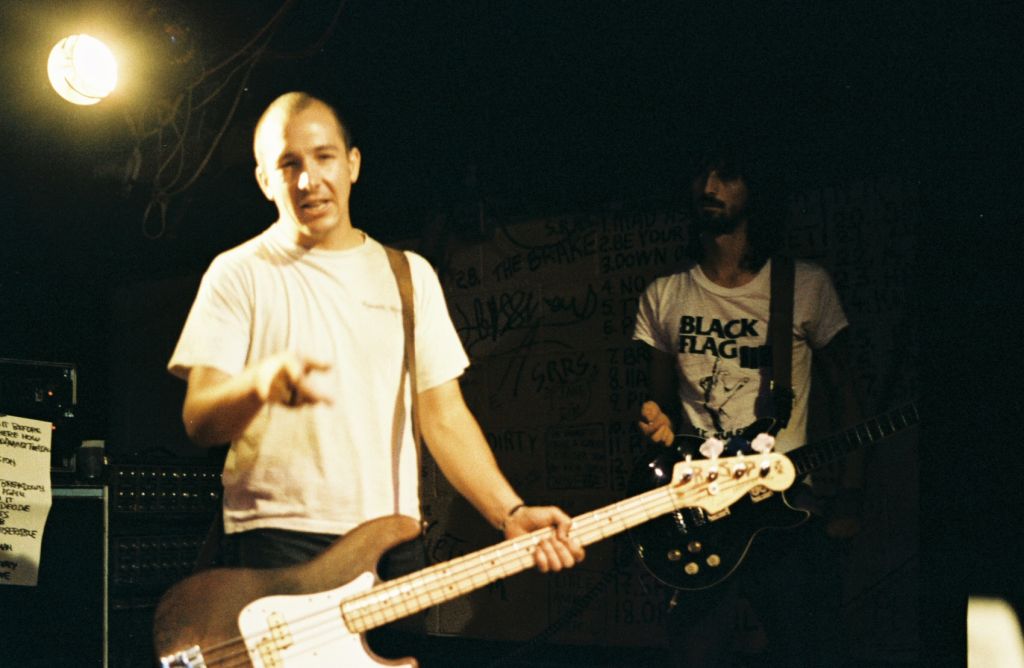
Andrew:
Piggybacking onto my last question here a bit. People like to put artists in boxes and define them, but Würm was a band that sort of refused to be defined. I know people like to adhere to the genre “Sludge Metal” to Würm, but that’s not really correct, is it? I see no definitive line you walked, or box to put you in. Would you agree?
Chuck:
We thought of ourselves as Metal but we were also very into harder Acid Rock, Progressive Rock, and anything we found interesting or emotionally powerful. We did a great cover of the Seeds‘ “Pushing Too Hard” in the middle of ‘I’ve Heard It Before’ and a cool cover of ‘Secret Agent Man.’ We even played the Adam’s Family theme with modified WÜRM-based lyrics.
Andrew:
When I listen to Würm, I at times feel some Black Sabbath and Blue Cheer vibes. There is a lot of depth and power to the music of Würm. Would you agree? If so, it’s kind of fitting- two Proto-Metal bands influencing another Proto-Metal/Punk band!
Chuck;
Sabbath and Cheer are on point. We were very into both bands, especially Black Sabbath. Black Sabbath had been one of my favorite bands since I discovered them in 1970. Blue Cheer’s contribution was their wild take on Acid Rock on their first album Vincibus Eruptum which I picked up from a used bin in 74.
WÜRM’s connection with Black Flag started with the pre-Black Flag band Panic members, Ginn and Morris, hanging out pretty much every night at our WÜRMHOLE practices. Our rehearsals gradually became small shows or parties attended usually by 5-25 people.
Andrew:
I am sure most fans of Würm by now have heard about the legendary practice and hang-out space, the Würmhole. It’s become part of the mystique and allure of the band. What can you tell us about that space and how it came to be? Any fond or interesting memories?
Chuck:
The WÜRMHOLE was the last in the string of 76-77 WÜRM pads. We were finally forced out by a city council order enforced on our landlord. The spot was great in a lot of ways. Large private and secure (pretty much pig proof). We’d learned a lot of lessons along the way about avoiding police and noise problems that we’d put to good use. We had a good PA and in general, it was the best spot we’d had. It’s hard to argue with living right on the beach in the spring and summer. It got a little more rugged when it started to get cold out. We eventually expanded to the whole two-story former restaurant-bar downstairs and changing stall and bathhouse upstairs of the building. PANIC moved into one of the downstairs (Former dining room) spaces in the late summer of ’77 and the extra band people and energy pushed it all over the top. Things started to get a little wild, even out of control. We had a couple of big parties at the end of the summer where WÜRM, Panic, the Street Kids (another band that’d moved into the remaining downstairs space) and I think even the Germs jammed.
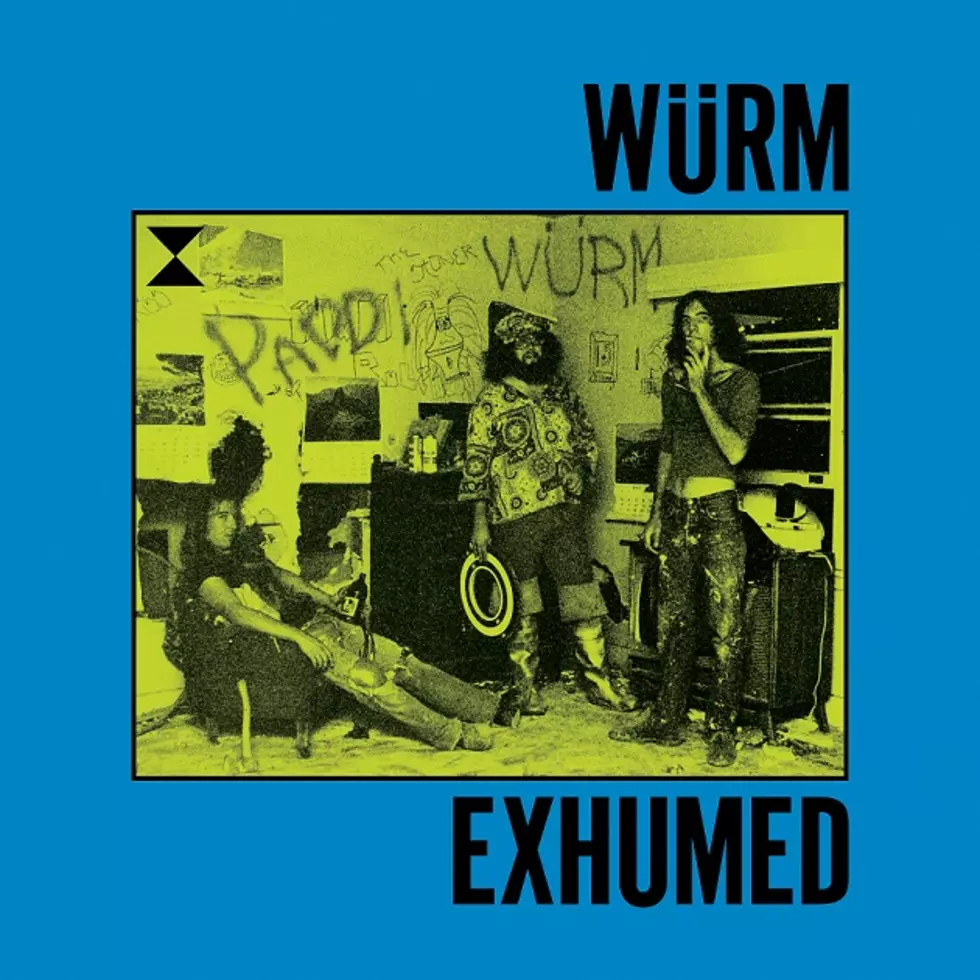
Andrew:
In 1977, Würm recorded an album, but the tapes ended up being scrapped, and shortly thereafter Black Flag was on its way with some of Würm’s music actually being re-worked on early Black Flag releases. Can you tell us why you chose not to put the Würm album out at the time?
Chuck:
In 1980, WÜRM was a dead band. Ed had quit at the end of 1977 to go live in Chicago with his girl. Lou was spacing out somewhere and I had no money but a lot of exciting music around me. Embassy Records who had sponsored the WÜRM session had walked away from the project and gone out of business even before we mixed. They never paid for the sessions or the 2″ tape. We’d tracked and made a rough to cassette and it’d stopped there. In 1980, when Media Art let us know they were closing, I had very little money and SST records were in the same spot. What little money remained of my savings after paying for the Jealous Again sessions was used to help pay for the last available recording time at Media Art before they closed forever instead of paying for the WÜRM’s Embassy Session to ransom the WÜRM 2″ tapes and then pay to finally mix it. That last Media Art studio time was put to good use. We recorded the Stains, I believe Saccharine Trust’s ‘Pagan Icons’ and possibly Minutemen‘s ‘Punch Line.’ Sadly, Media Art sold the WÜRM 2″ tapes as used tape. I stand by the decision, but it’s a bummer the tapes are lost. I adapted three WÜRM lyrics to become the Black Flag songs ‘I’ve Heard It Before,’ ‘Padded Cell’ and ‘Modern Man.’ I liked the lyrics and wanted them to be heard.
Andrew:
I am a big vinyl collector and I am the proud owner of an original copy of Feast. The cover was pretty provocative (for the time), and yet it’s sort of fitting. I’ve always imagined it as the woman on the cover presenting perhaps a poison apple for us to feast on?
Chuck;
Cool take on it. I was making a biblical reference. The picture is really cool. I’ll say some much-deserved thanks to Naomi Petersen for taking the photo and my friend Suzi for being the model.
Andrew:
In my opinion, Punk Rock guitarists never truly get their due. Ed Danky was a really good player. I’ve heard that he was initially a trumpet player. Is that true? I’ve always felt the combination of both your thunderous bass playing and Ed’s ferocious guitar riffs shaped the Würm sound. Songs like ‘Deathride’ really showcase that. Can you tell us anything about him as a player? How did you two meet? What was it like playing with him?
Chuck:
Ed was a great and unique guitarist. He was apparently a good trumpeter (I never heard him play) and even played in the El Camino College marching band when he was in high school. Interestingly, he was a left-handed player and played a normal right-hander’s guitar. To me, the marching music he’d played comes through in Ed’s composition and feel. The fact that his dominant hand was his picking or rhythm hand rather than his fretting or tone and harmony hand also lends to his unique approach. I gave him his first guitar and we learned to play and compose together. He had a little bit of a leg up on me having played trumpet before.
Andrew:
Some of our readers may or may not know this, but Würm released a 7” on Record Store Day drop #2 on September 26th. It’s called Poison/Zero Sum. This is the first new music from Würm in over thirty years! What can you tell us about it? How did it come about?
Chuck:
When WÜRM reformed in 2019 late with ’77 drummer Loud Lou, my friends Phil from Seals With Antlers, and German Gonzalez, I did it to have an outlet for my compositions and because I love to jam and perform live. After we’d learned a set of WÜRM’s classics, I introduced the new band to a couple of my songs to see if they liked them and how they sounded. They loved ’em and the songs sounded great so I asked my friends Josh Landau (Shrine) and Dave Jones (who’d engineered recordings of the Chuck Dukowski Sextet (CD6) and the SHRINE with me at his Mar Vista Wasatch Recording if they were down to help. Josh volunteered his amazing Eliminator Studio. The Chuck Dukowski Sextet (CD6) had recorded about half of our Haunted album there and I’d recorded the Shrine’s ‘Mirror Fits Like A Glove’ single there before. Dave Jones volunteered his skills and some of his sweet gear to the tracking session at Eliminator and we mixed at his Wasatch Studio annex. It all came together fast and ORG music agreed to a release. FUCK YEAH!
Andrew:
This new release has excited a lot of people. Can we expect any more new music from Würm going forward? What about a tour?
Chuck:
The pandemic has fucked everything. I have no plans to tour. We’ll have to see where things settle when our world pulls itself outta the mess it’s in.
Andrew:
You seem to have developed a great working relationship with both Org Music and Record Store Day. It must have been a trip digging out all these songs you hadn’t heard in so long! I’ve always felt that Org is an absolutely awesome label. What’s it been like working with Org and RSD?
Chuck:
ORG is great. Nice people and effective. They have released all of my music since releasing The Chuck Dukowski Sextet’s Haunted. They wanted a WÜRM retrospective album and so they share some of the credit for WÜRM 2020 happening. They were similarly proactive with the CD6 getting us to record a new and ripping version of my old jam ‘My War’ for a split Chuck Dukowski Sextet/ Secondmen 7″. Dave Jones recorded that version of ‘My War’ at his Wasatch recording in one night to 8-track tape. I’m proud of that recording and I think it’s the best-recorded version of the song.
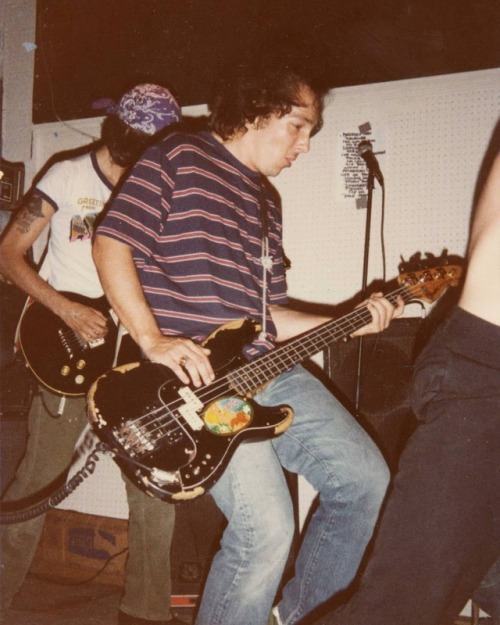
Andrew:
A lot of people try to define what it means to be “Punk.” I’ve always felt that “Punk” was more of a mentality than a genre per se. I think a Jazz or Folk artist can be as “Punk” as someone who plays “traditional” guitar music. What are your feelings about that? What are your thoughts on the idea of genres in general?
Chuck:
Genres never start as genres. It’s important to keep that in mind. When they start, they come about as a part of the aesthetic/ideological dialectic. As people become more conscious of what they are doing, key elements get identified, and looking back, a genre is described.
Andrew:
You’re also a member of the fittingly genre-bending Chuck Dukowski Sextet with both your Wife and Son. Tell us about that. What’s it like being in a band with your immediate family?
Chuck:
I love being in a band with my family. It’s perfect. On top of it, Milo (guitar) and Lora (vocals) turned out to be a couple of the best musicians I’ve ever worked with.
Andrew:
Do you collect vinyl? Tapes? CDs? Or are you all digital now? If so, what are some albums that mean the most to you? How big is your collection?
Chuck:
I have a pretty large music collection made up of (Vinyl 1000+), CDs (a couple thousand), and MP3. I still have the first 7″ and LP I purchased in my collection and play them from time to time. CDs are less effective archival artifacts but I have a lot of great music stored on CDs. I still have a few live recordings on cassette tapes. MP3 music seems kinda transitory but I have lots.
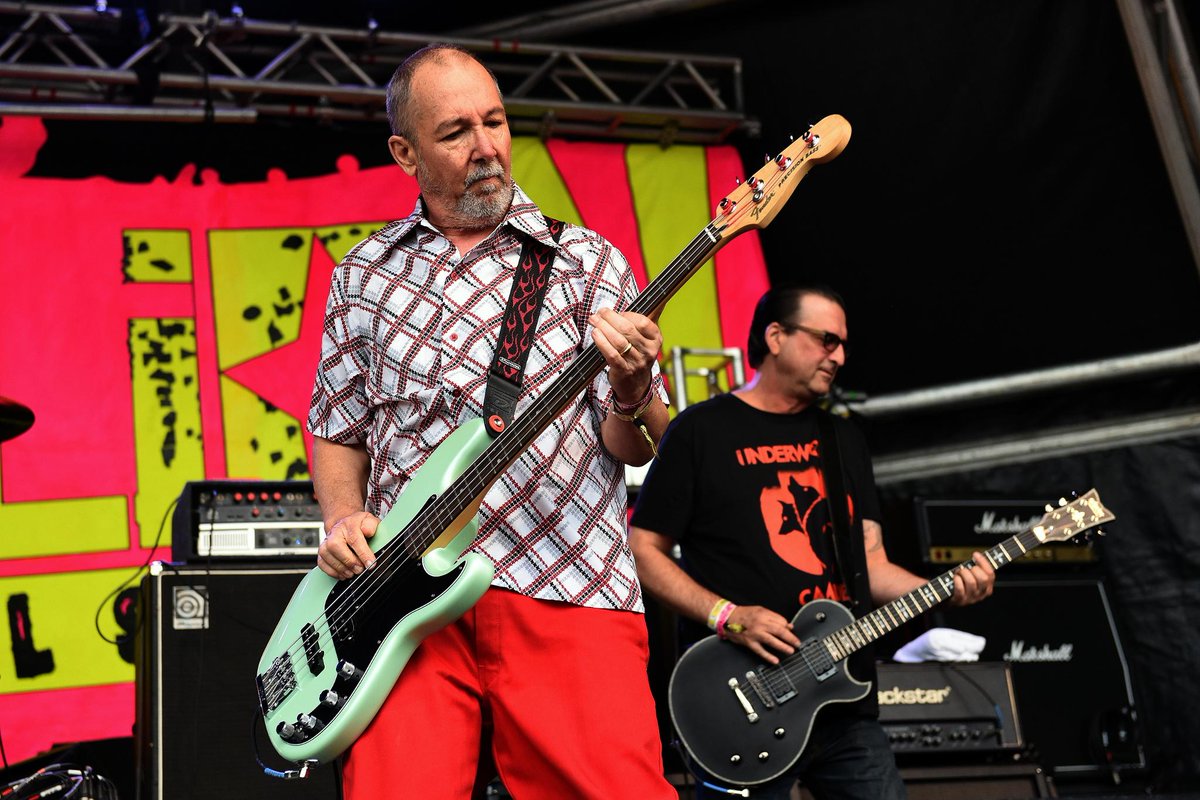
Andrew;
Last question. With both Würm and Black Flag, you were so ahead of the curve. You took chances and it really resulted in some truly influential and special music. Has today’s musical landscape changed for better or worse? Are there any bands out there that you think are carrying the torch? What advice do you have for young musicians trying to get their start?
Chuck:
There is great music being made today. A big part of why I like playing shows is to be in contact with other artists and their ideas and music/ art. Over the past 20 years, our kids have helped me keep in touch with new stuff. Just lately, in pandemic lockdown life, I have not experienced any brand new musical awesomeness. When I was playing lots of shows with the CD6, I loved so much of the music groups around me were playing. That was less than 10 years ago and some of those people are still active. Milo’s current music is amazing. I wonder what Josh Landau of The Shrine has cooking, and if Wylie Cable of Grapes and Nuts has done anything cool lately. WÜRM was just starting to play shows when the COVID hit sadly putting the brakes on stuff. For humans, music and art are essential and eternal.
I enjoy the recorded music I have and the live music I have already experienced, and I’m eagerly looking forward to more.
It seems that the ways people become aware of new music have changed a bit. It is easy to access much more now through the internet and that has changed the music people make. There is more general awareness of music from different eras and genres. I enjoy the openness to genre and eras that I experience in the young musicians and fans I know. In the past music was more divided by era. I’m excited by much of the music I’ve heard from younger artists.
In terms of getting across, getting one’s music out and getting it recognized seems to have been influenced by some of the same things. In the same way, it’s easy with the internet to explore a wide range of music/bands, it is also easy to throw your music into that mix. YouTube offers live and studio recordings of most everything, and making recordings has become dramatically easier/cheaper and more widely available. Easy access to the record and to make those recordings available is a blessing but it also creates a problem of overabundance. The problem now is sorting out what to pay attention to. In the 70s and 80s, access was the primary problem but it also limited the choices. Access was more controlled by labels, stores, publications, radio, and recording studios. With all of these gatekeepers, the stuff heard on the radio, found in stores, or heard live was a refined and small sample of the music people made. To summarize, the big problems of today are attention and sorting, and the big problem of the past was access.
To succeed, Musicians need to keep their artistic agenda lined up for the long haul. It takes a long-term effort to build artistic skills and the skills, contacts, and audience interest to manifest music. Like everything, there are times when it is more or less easy to get things going. The important thing is to keep going. To use a surfing analogy, when the next set rolls in you’d better already be in the water if you want to catch a ride. In my opinion, it takes a combination of luck, consistent effort, and skill to achieve success. Like surfing, you need to be out there trying to catch the luck wave. Then you need to have the effort and skills to be able to take advantage of the wave by catching and working it for a good ride. Sometimes, it’s a struggle, but you have to persevere. I think most people’s younger, primarily school-based experience teaches too short of an attention and effort span for real-life endeavors. It takes years of focused effort to build and establish bands and businesses.
On the actual art, I think it is very important to be guided by your own ideas, spirit, and interest/ taste. Patiently develop them, manifest them, and then make a place for them. If you are working with your own spirit and taste, you will have something distinctive that you are going to be the best at. Improving your skills then makes them better. Following rarely, if ever, really works out. If you’re behind the swell, you’ll never catch the wave. It is my opinion that you get nothing from following and it can blind you to your own uniqueness, and your uniqueness is the most important thing you have. Don’t be afraid to not fit in. Get good at what you do and expose people to it. With effort and luck in a bit, you will have something that you are proud of and others will enjoy. Good Luck.
Interested in learning more about the music of Würm? Check out the link below:
Be sure to check out the full archives of VWMusic Interviews, by Andrew Daly, here: www.vwmusicrocks.com/interview




Leave a Reply